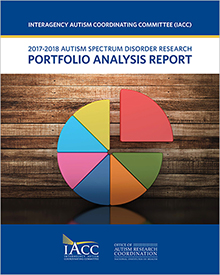- For Immediate Release
Tuesday, April 27, 2021 - Contact: Office of Autism Research Coordination/NIH
Email: IACCPublicInquiries@mail.nih.gov
Publication Release of the 2017-2018 IACC Autism Spectrum Disorder Research Portfolio Analysis Report

In 2008, the Office of Autism Research Coordination (OARC) began issuing a series of IACC Autism Spectrum Disorder Research Portfolio Analysis Reports that describe and analyze the autism spectrum disorder (ASD) research portfolio across multiple government and non-government funders in the United States. The reports provide comprehensive information about autism research funding to the Interagency Autism Coordinating Committee (IACC), a U.S. federal advisory body, to help in its efforts to monitor ASD research progress and trends. This information is also used by advocacy organizations, government agencies, private research funders, and the broader autism community to understand the ASD research funding landscape.
The 2017-2018 IACC ASD Research Portfolio Analysis Report represents the tenth and eleventh years of data collected and the eighth comprehensive report of U.S. ASD research funding across both the federal and private sectors. Project information was collected from 23 federal and private funders, including five private organizations that are new to the analysis. Overall, funding for ASD research among both federal and private funders totaled $373.1 million and spanned 1,495 projects in 2017 and totaled $387.7 million and spanned 1,526 projects in 2018. Over the eleven years of data available, autism research showed an overall upward trend in funding, increasing by 74.2% since 2008.
The report aligns data on individual research-related projects with Objectives in the 2016-2017 IACC Strategic Plan, providing an accounting of how much funding has supported projects related to Strategic Plan Objectives. Every Objective in the 2016-2017 Strategic Plan had associated projects and funding in 2017 and 2018, indicating that the vast majority of priority areas identified by the IACC in the Strategic Plan Objectives were also identified as priority areas by federal and private research funders. As in previous years, research on the biology of ASD continued to be the largest area funded and research on services and lifespan issues continued to be the smallest. However, it is notable that funding for research on lifespan issues has grown considerably in recent years. This growth enabled the development of new subcategories to describe in more detail the nature of research within this area. Analyses of subcategories of lifespan issues research were include in the Portfolio Analysis Report for the first time. Also new to the 2017-2018 IACC ASD Research Portfolio Analysis Report is a comprehensive analysis of the Cross-Cutting Objective on ASD in females. Lastly, the report introduces a new examination of projects focused on addressing racial, ethnic, geographic, and socioeconomic disparities in ASD, which has been an area of growing interest in ASD research. Each of these new analyses provides insight into research in emerging areas and can be used to highlight potential gaps in research and identify areas in need of increased research investment.
To accompany the 2017-2018 IACC ASD Research Portfolio Analysis Report, detailed federal and private organization project data are available in the Autism Research Database (ARD), accessible via the IACC website. This database provides stakeholders with a centralized place from which to gather valuable information about ASD research that can support their efforts to serve the autism community.
***
The IACC is a Federal advisory committee that was created by Congress in order to accelerate progress in ASD research and services. The IACC works to improve coordination and communication across the Federal government and work in partnership with the autism community. The Committee is composed of officials from many different Federal agencies involved in autism research and services, as well as adults on the autism spectrum, parents and family members of individuals on the autism spectrum, advocates, researchers, providers, and other public stakeholders. The documents and recommendations produced by the IACC reflect the views of the Committee as an independent advisory body and the expertise of the members of the Committee but do not represent the views, official statements, policies, or positions of the Federal government. For more information on the IACC, please visit: iacc.hhs.gov.


